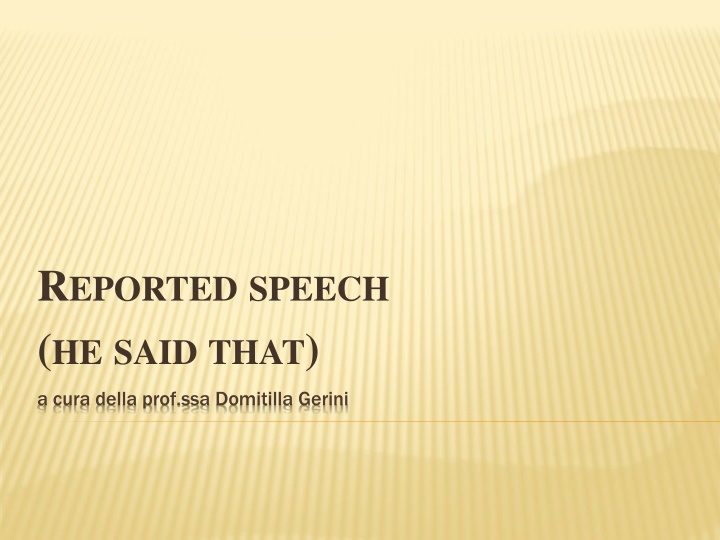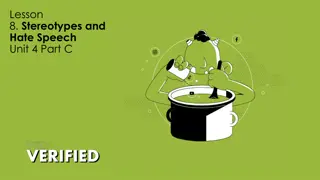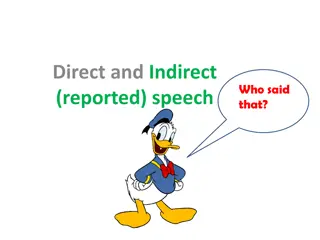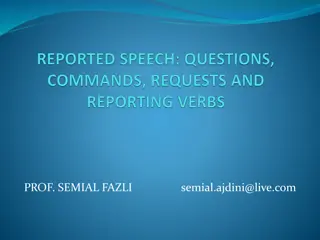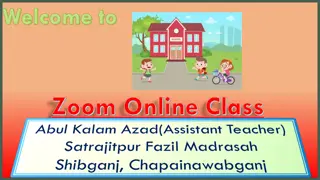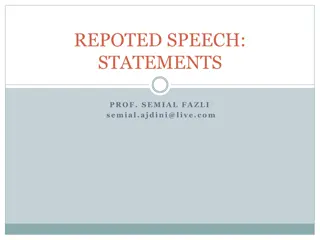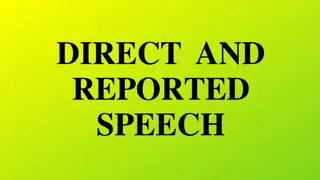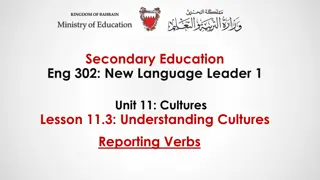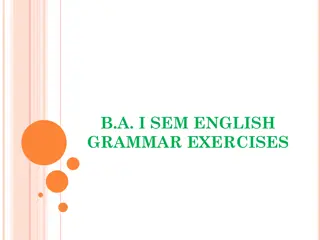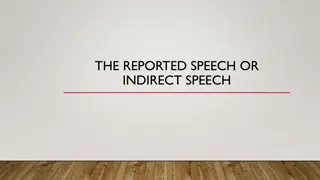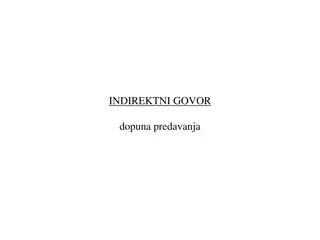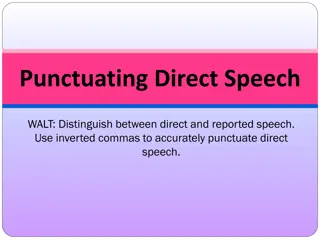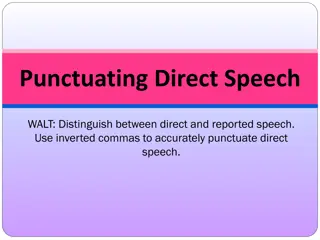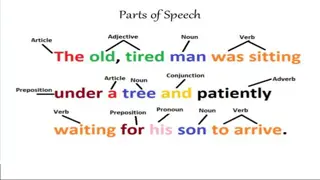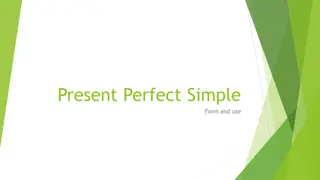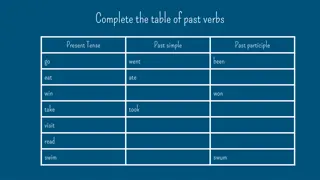Mastering reported speech: Rules and tense changes explained
Explore the fundamental rules of reported speech through examples and detailed explanations. Learn how to convert direct speech into reported speech effectively while understanding the necessary tense changes. Discover the essential guidelines for transforming statements accurately in English grammar.
Download Presentation

Please find below an Image/Link to download the presentation.
The content on the website is provided AS IS for your information and personal use only. It may not be sold, licensed, or shared on other websites without obtaining consent from the author.If you encounter any issues during the download, it is possible that the publisher has removed the file from their server.
You are allowed to download the files provided on this website for personal or commercial use, subject to the condition that they are used lawfully. All files are the property of their respective owners.
The content on the website is provided AS IS for your information and personal use only. It may not be sold, licensed, or shared on other websites without obtaining consent from the author.
E N D
Presentation Transcript
REPORTED SPEECH (HE SAID THAT) a cura della prof.ssa Domitilla Gerini
LOOK AT THIS SITUATION: I m feeling ill.
IF YOU WANT TO TELL SOMEBODY WHAT SARAH SAID THERE ARE TWO WAYS OF DOING THIS: you can repeat Sarah s words (direct speech) you can use reported speech speech: reported Sarah said, I m feeling ill feeling ill I m Sarah said that she was that she was feeling ill. feeling ill.
IMPORTANT RULES COMPARE THE FOLLOWING SENTENCES: Sarah said said, I I am am feeling ill (direct) Sarah said said that she she was was feeling ill (reported) when we report what someone else said: when we report what someone else said: 1. 1. the the personal personal pronoun 2. 2. we we are are usually usually reporting reporting reporting verb verb (say, 3. 3. and and we we normally normally change speaker, speaker, it it moves following following slide) slide) pronoun changes reporting at at a a later (say, tell tell ) ) in in the change the moves one one tense changes later time the past past tense the tense tense used tense back back (see time so tense used by (see table so we we use use the the by the the original original table on on the the
TENSE CHANGES IN REPORTED SPEECH - 1 Original Original statement statement present present simple simple I want to buy a new car Reported Reported statement past past simple simple He said (that) he wanted to buy a new car past past continuous continuous He said (that) the sun was shining statement present present continuous continuous The sun is shining past past simple simple There was a terrible storm past past perfect perfect He said (that) there had been a terrible storm present present perfect I haven t seen her for a long time perfect past past perfect perfect He said (that) he hadn t seen her for a long time imperative imperative Don t go away! infinitive infinitive He told me not to go away
TENSE CHANGES IN REPORTED SPEECH - 2 Original Original statement statement Reported Reported statement statement be be going going to to I m going to win was was going going to to He said (that) he was going to win will will I will spend two hours in a bath would would He said (that) he d (he would) spend two hours in a bath can can I can t find my keys could could He said (that) he couldn t find his keys may may I may win might might He said (that) he might win must must I must get my hair cut must must/ /had He said (that) he had to get his hair cut had to to (see slide 9)
BUT These verbs do do not not change change when later later time when they time: they are are reported reported at a at a Could Could Would Would Might Might Ought Ought to to Used Used to to and verbs in the past past perfect perfect See the following table for examples
EXAMPLES VERBS THAT DO NOT CHANGE Original Original statement statement Reported Reported statement statement could could I could ran faster once could could He said (that) he could run faster once would would I would phone her if I had her number would would He said (that) he would phone her if he had her number might might I might look for another job might might He said (that) he might look for another job ought ought to to You ought to smoke less ought ought to to He said (that) you ought to smoke less used used to to She used to be a good guitarist once used used to to He said (that) she used to be a good guitarist once past past perfect perfect I hadn t expected the storm past past perfect perfect He said (that) he hadn t expected the storm
MUST OR HAD TO? When we report must, we can use either mus in the reported speech, but had must or had had to to had to to is more common Example: Kate: I must buy some fruit Kate said she must/had to buy some fruit BUT BE CAREFUL! BUT BE CAREFUL! use must must, , not had to, , when negative sentence Ex.: Paul You mustn t tell Sally our secret Paul said we mustn t tell Sally our secret or a or a deduction deduction Sarah: Jim must be tired after the flight Sarah said Jim must be tired after the flight We We use sentence when we we report report : a a negative
REFERENCES TO TIME - 1 BE CAREFUL: expressions of time also change expressions of time also change REFERENCES TO TIME - 1 BE CAREFUL: Original Original statement statement now now I ll do it now Reported Reported statement statement at at that that moment/ at moment/ at that She said (that) she would do it at that moment that that day day She said (that) she wasn t working that day that that night night She said (that) there was a party that night the the next next day day/ the / the following following day She said (that) she would call him the following day that time time/ / then then today today I m not working today tonight tonight There s a party tonight tomorrow tomorrow I ll call him tomorrow day
REFERENCES REFERENCES TO TO TIME TIME - - 2 2 Original Original statement statement yesterday yesterday I saw Alex yesterday Reported Reported statement statement the the day day before She said (that) she had seen Alex the day before the week the week before before/ / the week week She said she had had an exam the previous week before before/ / earlier earlier/ / previously She said (that) they had arrived two hours earlier before/ the / the previous previous day day last week last week I had an exam last week the previous previous ago ago They arrived two hours ago previously
as well as REFERENCES TO PLACE: Original Original statement statement here here I saw him here yesterday Reported Reported statement statement There There She said (that) she had seen him there the day before
REPORTING QUESTIONS - 1 For yes/ no question we use IF IF or WHETHER WHETHER Examples Direct speech: Is the weather good? Reported speech : Rachel asked whether weather was good whether the as you can see questions are reported USING THE WORD ORDER OF A STATEMENT WITH THE VERB AFTER THE SUBJECT - rather than that of a question We don t say: Rachel asked whether was the weather good but: Rachel asked whether the weather was good SUBJECT VERB
REPORTING QUESTIONS - 2 Questions with question words (who, what, etc.) keep these words when they are reported and use the word order of a statement (with the verb after the subject) Examples Direct speech: How do you feel? Reported speech: Rachel asked James how he felt (not not Rachel asked James how did he feel)
VERBS USED FOR REPORTING ( (TO TO SAY SAY) ) We often use say He said say to report what somebody said said (that) he was going to win but but... ... pay pay attention attention: : If there is an object (a noun or a pronoun) say must be followed by to to: He said said to to me (that) he was going to win (not he said me)
VERBS USED FOR REPORTING ( (TO TO TELL TELL) ) When we use tell is always followed by an object without to always followed by an object without to: He told told them (that) he was going to win (not he told to them , he told that ) tell to report what someone said, it
REPORTING IN THE SAME TENSE If the reporting verb is in the present tense (e.g says), we use the same tenses as the original speaker Example: Tom I ve missed the bus so I ll be a bit late Tom says he s missed the bus so he ll be a bit late
EXCEPTIONS TO THE GENERAL RULE - 1 If the reporting verb is in the past (e.g. said), we sometimes use the same tenses as the original speaker if if the situation the situation is is still Example 1: Robert I have three sister There are two possibilities when reporting this sentence: Robert said he has has three sisters or Robert said he had had three sisters still true true:
EXCEPTIONS TO THE GENERAL RULE - 2 Example 2: Carlo: I m getting married in June If we report what Carlo said before June we can say: Carlo said he is getting married in June or Carlo said he was getting married in June
OTHER REPORTING VERBS ORDERS and REQUESTS REQUESTS are reported using reporting verbs such as: ask order invite OFFERS OFFERS, , ADVICE ADVICE and PROMISES PROMISES are reported using the following verbs: offer advise promise SUGGESTIONS SUGGESTIONS are reported using: suggest recommend propose ORDERS
AND NOW GIVE IT A TRY! Try to turn the following sentences into reported speech and then check your answers! 1. Jane : There was an interesting documentary about climate change yesterday 1. Jane said there had had been been an interesting documentary about climate change the the previous 2. Susan : Jim, where will you be tonight? 2. Susan asked Jim where he would 3. Pete Mary, are you going to meet your friends here next Saturday? 3. Pete asked Mary if/ whether she was there there the the following following Saturday Saturday. previous day day. would be that that night night. was going going to to meet meet her friends
